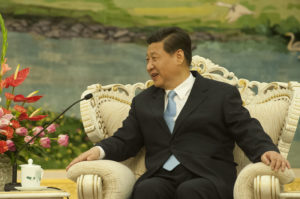
Secretary of Defense Leon E. Panetta meets with Chinese Vice President Xi Jinping prior to a meeting in Beijing China, Sept. 19, 2012. Panetta visited Tokyo, Japan before continuing to Beijing and traveling to Auckland, New Zealand on a week long trip to the Pacific. DoD photo by Erin A. Kirk-Cuomo.
China is not happy with the United States and its ever-closer ties with Australia, Japan, and India. The four countries are deepening the ties between them formalized in a group known as the Quad. The Quad’s mission, as seen by China, is to deter Chinese progress in the region. Kathrin Hille reports for the Financial Times:
Beijing could not have made its displeasure with Joe Biden any clearer. As the US president met leaders of the Quad security grouping in Tokyo, Chinese and Russian nuclear bombers flew over the Sea of Japan.
But China is also employing less crude tactics to counter the US in the form of a diplomatic drive. Just as Biden embarked on his Asian trip, Beijing began promoting its Global Security Initiative (GSI), a proposal for an alternative security order.
Floated by President Xi Jinping in April, the initiative is a collection of policy principles such as non-interference and grudges against US “hegemonism”.
Now Beijing is trying to entice other countries on board. In a video address to foreign ministers from the Brics grouping of big emerging economies on May 19, the Chinese president spoke of the myriad virtues of GSI.
Xi urged fellow Brics members Brazil, Russia, India and South Africa to “strengthen political mutual trust and security co-operation, . . . accommodate each other’s core interests and major concerns, respect each other’s sovereignty, security and development interests, oppose hegemonism and power politics, reject cold war mentality and bloc confrontation and work together to build a global community of security for all”.
Over the following days, Wang Yi, China’s foreign minister, extracted declarations of support for GSI from Uruguay, Nicaragua, Cuba and Pakistan. Indonesia and Syria have endorsed it, too.
The initiative is part of Beijing’s increasingly frantic efforts to oppose US-led blocs, which it blames for global conflict and tension.
Read more here.
